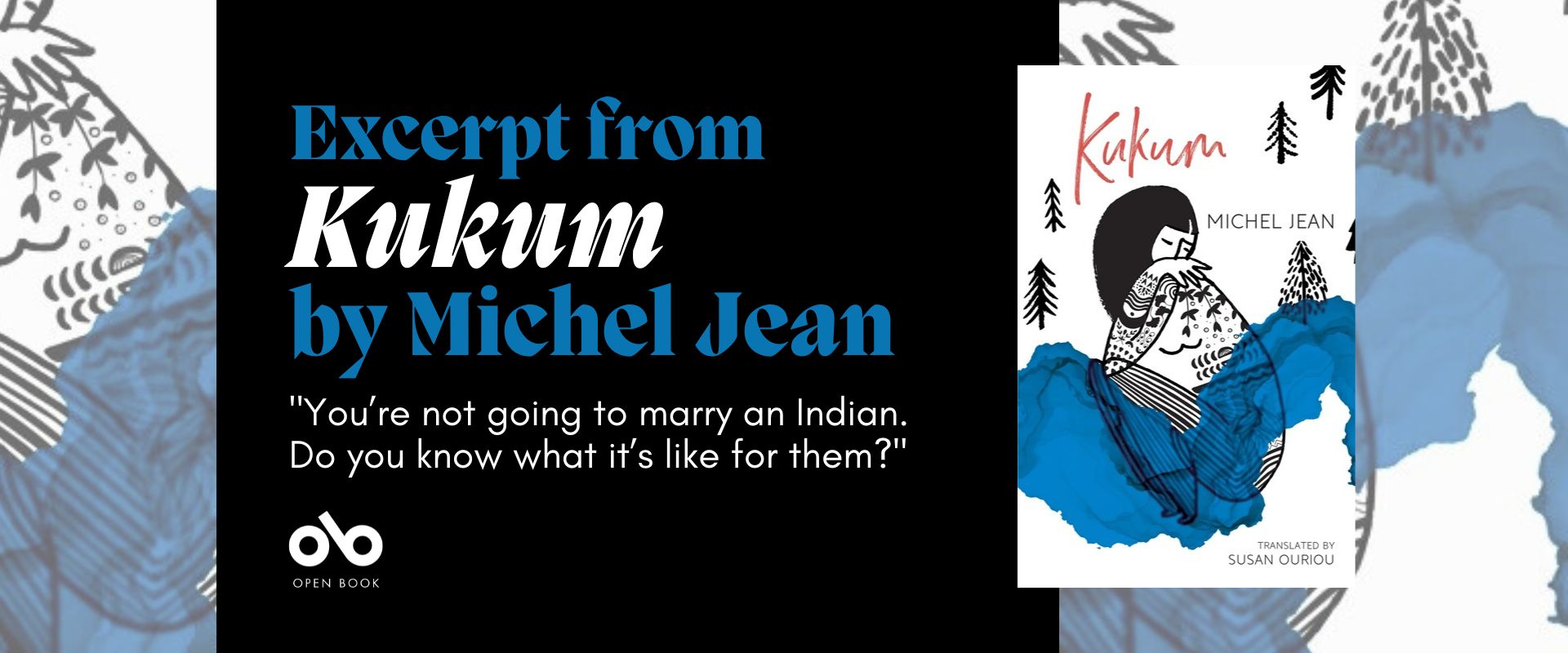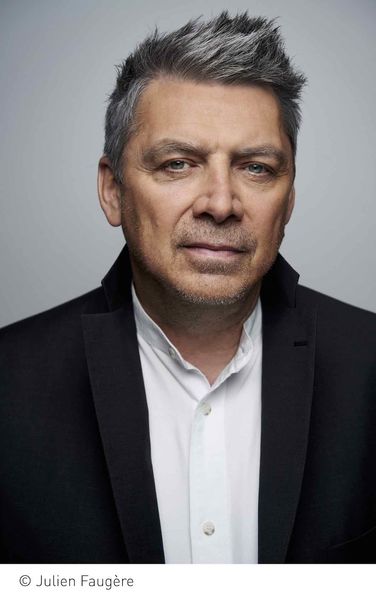Read an Excerpt from Michel Jean's Kukum, a Fictionalized History of His Innu Great-Grandparents' Extraordinary Love Story
Almanda Siméon, an orphan raised by her aunt and uncle in the tiny Quebec community of Saint-Prime, changes her life when she falls in love.
Thomas a young Innu man, and both his and Almanda's families are shocked by the connection the two of them form. Almanda's deep love for Thomas and her adoption and eventual acceptance into the Innu community was an influential family story for acclaimed Quebec writer Michel Jean, who is Innu from Mashteuiatsh and the great-grandson of Almanda and Thomas.
Kukum (House of Anansi Press) is a fictionalized version of his ancestors' history, told in Almanda's voice, and the book manages to be many things at once: a love story, a coming of age tale, and a vivid, often tragic truth-telling of the loss and violence faced by the Innu community over nearly a century, seen through the personal lens of Almanda, her husband, and her children.
As Almanda learns the Innu language and adopts the nomadic existence of her husband's people, the story rises in hope and love. But soon, the lumber industry invades, blocking traditional routes and forcing a drastic lifestyle change for the Innu people in the area; and the long, dark shadow of the Canadian government's interference begins to loom as residence schools, confinement to reserves, and language loss begin to oppress the community.
A breakout bestseller in its original French, Kukum is now available for English readers in a gripping translation by Susan Ouriou. We are sharing an excerpt, courtesy of House of Anansi Press, here today, in which we see a naïve but determined young Almanda make her first tentative steps to becoming part of the Innu community and committing to the man she loves.
Excerpt from Kukum by Michel Jean:
Pointe Bleue
“Have you gone mad, Almanda?”
My aunt was a humble, hard-working woman. I had never before heard her raise her voice as she’d just done. “You’re not going to marry an Indian. Do you know what it’s like for them? They have a hard go of it in the woods. You’re not used to that kind of life. It makes no sense, my girl.”
I guess it did take a certain madness to leave for the woods with an almost-stranger, worse, a savage.
“I’ll get used to it, and they’ll teach me their language. Anyway, ma tante, look at us. It’s not like we’re living in luxury here. We’ve had no meat for two weeks now, nothing but buckwheat pancake to eat. You know I won’t have a dowry toward a wedding, so what future is there for me here?”
My aunt was no doubt afraid for me. But nothing could change my mind, and it didn’t take her long to realize it.
Your CanLit News
Subscribe to Open Book’s newsletter to get local book events, literary content, writing tips, and more in your inbox
The next week, my uncle harnessed the horse to the buggy, and we left for Pointe-Bleue. He wanted to stop in Roberval first, though, to buy a scythe. The road was in good condition and the animal trotted at a fair clip down the hills. The sun rose over the lake, a warm breeze caressed my cheeks, and my heart raced as we put more distance between us and the farm.
Roberval was just a small country town, but the church, with its tall tinplate spire sparkling in the sky, was imposing. Posh-looking houses with fine painted porches lined the main street, bordered by wooden sidewalks. Women in long dresses cut from costly fabric protected their pale skin from the sun with pastel-coloured parasols. The men, dressed in dark suits, wore elegant felt hats.
“You should try one, mon oncle.”
My aunt burst out laughing. My uncle jammed his straw hat down on his head, muttering something neither she nor I could make out.
The farm supply store was a good-sized building in which an industrious hustle and bustle reigned. In the yard, scythes and tillers of every size were carefully stored. My uncle stepped down and immediately headed for the main building. He came out a few minutes later with a man wearing a bowler hat, which I thought strange for someone who had farmers for customers. The merchant helped him find what he needed and carefully set the new tool in the back of the cart.
We headed north along a dirt road bordering the lake. Houses grew fewer and farther between. We advanced in the silence of the countryside. After a few kilometres, the road led to a strip of land sloping down to the shore. The wind had died, and the blue of the water merged with the blue of the sky. Ahead appeared a village like none I had ever imagined before.
Even though Saint-Prime was nothing more than a hamlet in the middle of nowhere, its buildings were disposed in an orderly fashion on either side of the main street. There was a general store and a few houses clustered round the church. In the distance could be seen the farms with their side buildings and their fences marking off the fields.
The village before me also had a church at its centre, a former chapel from the Métabetchouan mission that the oblate fathers had moved there ten years earlier, transporting it over the frozen surface of the lake. A store. A small square house with a sloping roof surrounded by a white fence that lodged the Hudson Bay Company’s trading post. But there were no streets, no intersections. No elegant passersby hurrying along wooden sidewalks. There were only tents planted in the sand in no apparent order in front of the lake.
Thomas waited for us where Pointe-Bleue began, sitting on an embankment of tall grasses. He jumped to his feet and waved. My uncle raised his straw hat, my aunt nodded, and I smiled. Then I noticed the spark in his eye. The same one that would be there till the day he drew his last breath.
“Come,” he said, his voice so soft it was like a whisper.
We left the horse and cart behind. People’s expressions grew blank as we passed, and I could feel my aunt stiffen. Later, I would understand that what we had interpreted as unfriendliness was nothing but an expression of timidity on the part of the Innu in the presence of people from elsewhere. After a while, we reached a small camp several tents strong set up at the foot of a hill.
“My family,” said Thomas
The Siméon clan consisted of his father, Malek, his brother, Daniel, and his sisters, Christine and Marie. Each had their own tent. Thomas was the eldest and it showed.
Other than Thomas and Christine, no one spoke French. Our conversation amounted to no more than a few words. Malek was a short man with a weathered face and gnarled hands, his gaze still sporting the same spark that Thomas had inherited. Marie and Christine wore wide flowered skirts and checkered smocks. Both had a scarf tied round their neck on which a heavy metal cross hung. Their hair was knotted into imposing buns on either side of their head, and they wore beaded felt caps in bright red and black.
Thomas showed me his tent. Inside, a thick carpet of fresh fir boughs covered the ground.
“It’s not very big,” I blurted out.
Christine shot me a glance in which I read both curiosity and distrust. With hindsight, I realize how strange my attitude must have seemed to both my family and Thomas’s. But, intoxicated by the images that Thomas had painted for me of a forest that went on for as far as the eye could see, I felt confident, convinced there was no future for me in Saint-Prime or, in any event, that if I stayed there nothing would change for me. That thought was unbearable. As it turned out, our modest house of wooden planks disappeared a long time ago. My uncle and aunt rest in peace in the small village cemetery, but cows still graze in their former fields, and morning and night, someone else looks after them.
What would my life have been like had a young almond-eyed hunter not ventured past there, drawn by a flock of wild geese in flight?
_______________________________________________________________
Excerpted from Kukum, a novel by Michel Jean. Translated by Susan Ouriou. ©2023 Michel Jean. Published by House of Anansi Press www.houseofanansi.com. Reprinted with permission.
Michel Jean is a writer, TV news anchor, and investigative journalist. The author of eleven books, he also writes and curates short stories and has edited two French-language collections showcasing Indigenous writers: Amun (2016) and Wapke (2021). In his 2012 novel Elle et nous, he opened up about his own Indigenous origins for the very first time. Kukum won the Prix France-Québec in 2020. Michel is Innu from Mashteuiatsh and much of his writing reflects his Indigenous origins.





